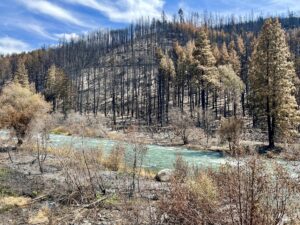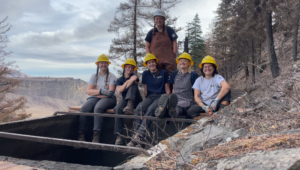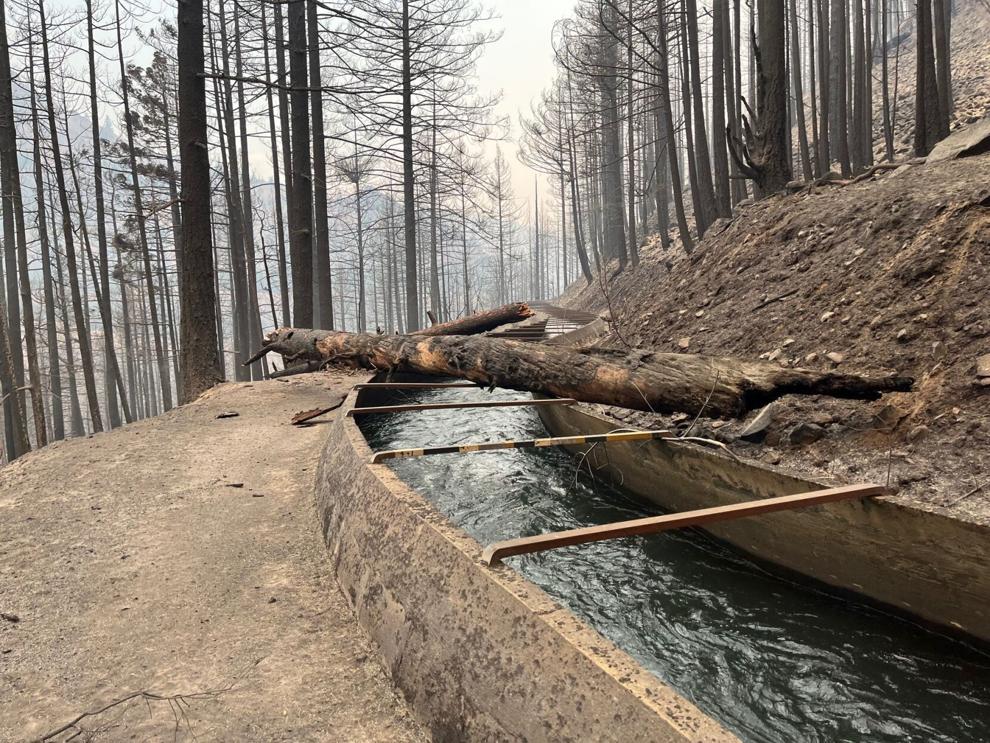Cut into the side of a mountain through forestland and chiseled across volcanic cliffs, including five tunnels through bedrock, the Yakima-Tieton Main Canal is a vital more than 115-year-old, 12-mile-long waterway that drops a thousand feet to supply irrigation water for 30,000 acres of apple orchards in central Washington. Workers started construction in 1906 and it started delivering water four years later.
Despite being an architectural man-made marvel with its 8-foot-deep, open-top tube construction, Mother Nature twice stopped the delivery of irrigation water. The first time was after the 1980 eruption of Mt. St. Helens, which left it clogged with sediment and debris. The second time was the summer of 2024 when the Rimrock Retreat Fire burned 45,600 acres of land, triggering evacuations, highway and forest closures, burning power poles, charring wildlife habitat and causing landslides and an ever-present danger of flash flooding.
The wildfire’s destruction forced managers to shut down the canal in October.
 “We’ve got structural repairs, concrete repairs, there’s still damage from boulders that hit the canal, there’s still damage from trees that fell and hit the canal.” Travis Okelberry, Yakima-Tieton Irrigation District manager, told KIMA-TV. “I’d say the level of repairs that are gonna be needed from the aftermath of this wildfire is probably more extensive than any repairs we’ve done in the past, just because of the magnitude of how much damage there is.”
“We’ve got structural repairs, concrete repairs, there’s still damage from boulders that hit the canal, there’s still damage from trees that fell and hit the canal.” Travis Okelberry, Yakima-Tieton Irrigation District manager, told KIMA-TV. “I’d say the level of repairs that are gonna be needed from the aftermath of this wildfire is probably more extensive than any repairs we’ve done in the past, just because of the magnitude of how much damage there is.”
The fire burned much of the Oak Creek Wildlife Management Area and its diversity of habitat that helps everything from elk and mountain goats to turkey, upland birds and small mammals. The Rocky Mountain Elk Foundation has a long history on that landscape. Between 2009 and 2011, RMEF helped spearhead an effort to buy more than 10,000 acres of private forestland that now makes up part of the Oak Creek Wildlife Area, public land managed by the Washington Department of Fish and Wildlife. RMEF also supplied funding for 51 different habitat treatments there over the years that conserved nearly 146,000 acres of habitat. It also served as the site of RMEF volunteer projects, including one as recent as two months before the fire.
RMEF was among those Okelberry reached out to for help. RMEF supplied grant funding for a multi-phase effort to repair the canal, including rebuilding 31 wooden crossings destroyed by the fire that allow elk, mule deer and other wildlife to cross the canal to reach winter range and a feeding area. The fire also destroyed five wooden ramps placed in the canal when it is dry during the winter months so wildlife can escape.
An October Yakima-Tieton Irrigation District communication expressed appreciation to its coalition of partners, RMEF included.
(Photo credit: Yakima-Tieton Irrigation District)

Crews installed wildlife crossings with materials provided by RMEF
